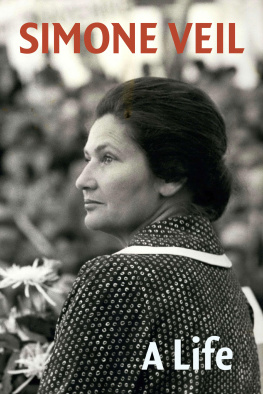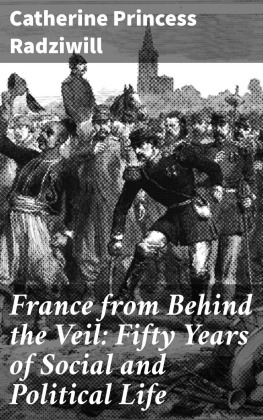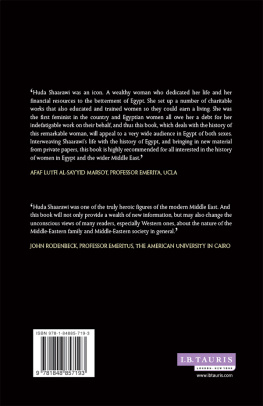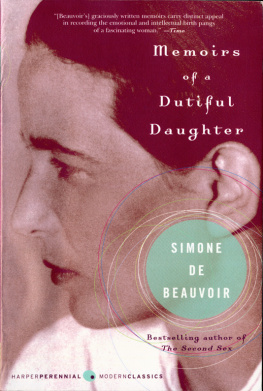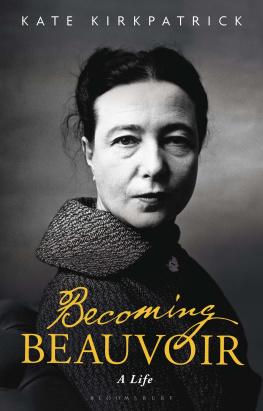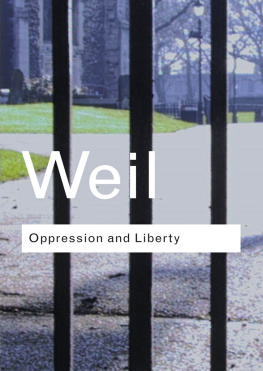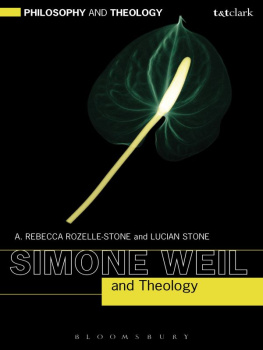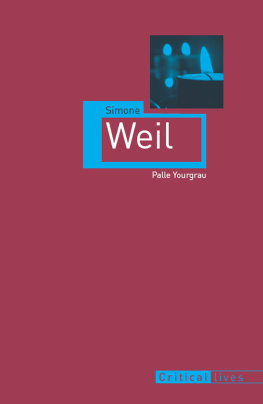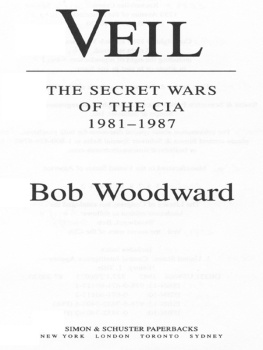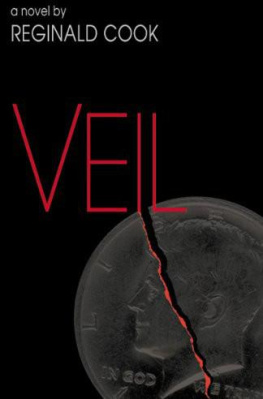
A Life
A Life
A Memoir
SIMONE VEIL
Translated by Tamsin Black
Haus Publishing
LONDON
First published in France as Une vie by Editions Stock
Copyright Editions Stock, 2007
This English translation first published in Great Britain in 2009 by
Haus Publishing
70 Cadogan Place
London SW1X 9AH
www.hauspublishing.co.uk
English language translation copyright Tamsin Black, 2009
The moral rights of the author have been asserted
A CIP catalogue record for this book is available from the British Library
ISBN 978-1-906598-23-5
Typeset in Garamond by MacGuru Ltd
Printed in Dubai by Oriental Press
Jacket illustration: courtesy authors collection
CONDITIONS OF SALE
All rights reserved. No part of this publication may be reproduced, stored in a retrieval system, or transmitted in any form or by any means, electronic, mechanical, photocopying, recording or otherwise, without the prior permission of the publisher.
This book is sold subject to the condition that it shall not, by way of trade or otherwise, be lent, re-sold, hired out or otherwise circulated without the publishers prior consent in any form of binding or cover other than that in which it is published and without a similar condition including this condition being imposed on the subsequent purchaser.
Ouvrage publi avec le soutien du Centre national du livre ministre franais charg de la culture.
This work was published with the support of the National Centre of the Book, French Ministry for Culture.
Publication of this book is supported by the French Ministry of Foreign Affairs as part of the Burgess Programme run by the Cultural Department of the French Embassy in London.
www.frenchbooknews.com
For Yvonne, my mother, who died in Bergen-Belsen.
For Papa and Jean, assassinated in Lithuania. For Milou and Nicolas, who died too soon.
As well as for my family and for the happiness they bring.
Maupassant, Maupassant whom I love, will not mind me borrowing the title of one of his most delightful novels to describe a life that is entirely factual.
S.V.
I
Childhood in Nice
T he photos of my childhood prove it: we were a happy family. What affection there is, as the four of us, one brother and three sisters, cluster around Mama! In other photos, we are playing on the beach in Nice, or gazing straight out of the picture in the garden of our holiday home at La Ciotat, or my sisters and I are in fits of giggles on a guide camp. Good fairies must have leant over our cradles at birth. Their names were Harmony and Complicity, and they gave us the best weapons to face the world. In spite of the differences between us and the difficulties we were to encounter, our parents gave us the warmth of a close family and, most important of all in their view, an education that was both intelligent and thorough.
Later, but too soon, fate contrived to muddy those apparently limpid waters until nothing remained of that joie de vivre . Like so many French Jewish families, death struck us early and hard. As I write these lines, I cannot help thinking sadly that my mother and father will never have seen their childrens adulthood and the birth of their grandchildren, or known the joy of an extended family circle. In view of what happened to us, they will not have realised the true value of the heritage, precious and extraordinary as it was, that they bequeathed us.
The 1920s were years of happiness for them. They were married in 1922. My father, Andr Jacob, was then thirty-two and Mama, Yvonne Steinmetz, eleven years younger. There was no mistaking a dashing young couple back then. Andr bears the quiet, undemonstrative elegance he never lost, just as he clung to the creativity of his profession as an architect, harshly disrupted by four years in captivity shortly after he won the Grand Prix de Rome. Yvonne had that radiant beauty that puts many people in mind of the star of the day, Greta Garbo. A year later, their first daughter, Madeleine known as Milou, was born. Another year went by and Denise was born, followed by Jean in 1925 and me in 1927. In less than five years, the Jacob family had gone from two members to six. My father looks satisfied. France needed large families, he thought. As for Mama, she, too, looks happy: her family filled her life.
Both my parents were born in Paris, in the Avenue Trudaine to be precise, a stones throw from one another in a quiet corner of the 9th arrondissement where many Jewish families lived at the beginning of the century before later moving on to other areas. Although distant cousins, they did not know each other. On my fathers side, the family tree shows them settling in France at least as early as the first half of the 18th century. My ancestors lived in Lorraine at that time near Metz, in a village which I took my family to see a few years ago. The last Jew in the village, a sprightly centenarian, was tending the cemetery. He showed us our ancestors graves, one of which dated back to the 1750s. You can imagine how moved we were to see these distant vestiges of our presence in the village.
Even before the Franco-Prussian War of 1870, my paternal ancestors had moved to Paris, where they settled as craftsmen. They made little silver boxes, which had some success for they were sold as far away as Central Europe. Later, the business declined and the family had to adopt a more austere way of life. My grandfather took a job as an accountant in the Paris gas company, the Compagnie Parisienne de Gaz. However, he clearly managed to give his children a sound education, because my father took lessons in fine art and won the second Grand Prix de Rome before becoming an architect. His brother graduated as an engineer from the prestigious engineering college, the Ecole Centrale.
Like all those assimilated Jewish families, my fathers was deeply patriotic and secular. His forebears were proud of the country that had granted the Jews full citizenship in 1791. The wave of anti-Semitism that engulfed the country at the time of the Dreyfus Affair did little to shake their comfortable sense of security. Normality was quickly restored when the Republic recognised the captains innocence. The descendants of 1789 could not be wrong, my grandfather is supposed to have declared, uncorking a bottle of champagne to celebrate the occasion. So, when war was declared in 1914, just when my father had finished his military service and was dreaming of launching himself into his professional life, he was sent to the front like all French men of his age. He was posted to Maubeuge and entered the corps of balloon observers, but he was captured in October 1914. He spent the rest of the war in prison in increasingly difficult conditions after several attempts to escape.
Those years had a profound effect on him. When we were children, he showed no sign, in his extreme concern for our education, of the light-heartedness the friends of his youth displayed. As for Germany, he saw her as a hereditary enemy and did not believe in the reconciliation preached by Aristide Briand.
I have fewer details about the members of my maternal family. They came from the Rhineland, my grandmother from Belgium, and they settled in France at the end of the 19th century. That whole little universe on my mothers side was fundamentally republican and secular, as it was on my fathers, a point on which he was absolutely strict. I have a memory of a scene that took place when I was eight or nine. An Italian cousin who was staying with us had taken me to synagogue with her. When Papa found out, he warned the cousin that if she ever repeated the initiative, she would be banned from the house.
Next page
